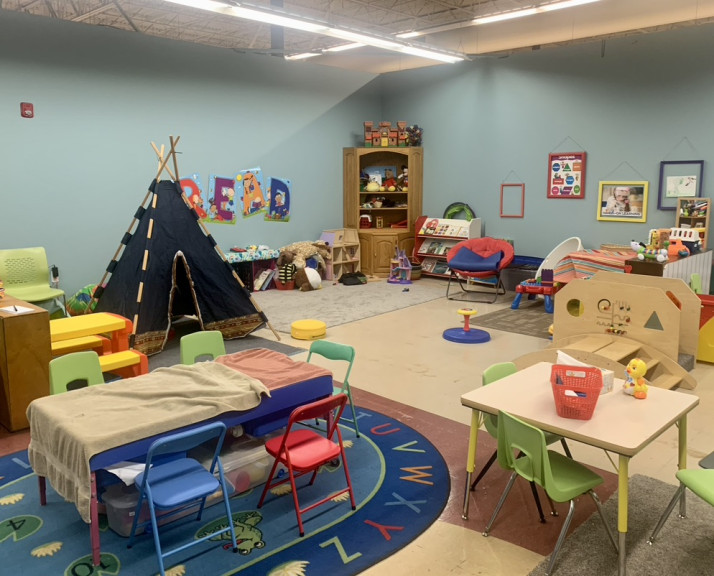Playgroup for children with autism coming to Urbana

The play room inside of Salt & Light Urbana has toys and activities for toddlers. Starting on Feb 28, the space will be utilized for playgroups for children with autism hosted by Salt & Light, TAP, and DSC. Piper Pascarella
URBANA - The nonprofit organization Salt & Light has partnered with Discover Self Community (DSC) and The Autism Program Affiliate of Illinois at Urbana-Champaign (TAP @ UIUC) to host play spaces geared toward families with children on the autism spectrum.
The playgroups are open to the public and act as a parent-coaching therapy model for families with children aged 2 to 5 years old who have an autism diagnosis, according to the Salt & Light and TAP Facebook pages.
The program teaches parents and caregivers ways to have successful and playful interactions with their child while building communication skills, they said on Facebook.
Lisa Sheltra, the Director of Community Engagement at Salt & Light, said the playgroups are an important opportunity for families to build a sense of community surrounding their child's diagnosis.
“The mission of Salt & Light is to share the love of God by fighting poverty with opportunities that empower people for lasting change,” Sheltra said. “The opposite of poor is not being rich; the opposite of poor is being whole.
“The person’s whole functioning is what fights poverty. We never want it to be divorced from those other things where people are gaining skills, experience, relationships or support.”
Sheltra said the playgroups align with the mission of Salt & Light by building a support network for families and helping them become “whole through empowerment.”
“We hope they are going to use that relational support system as a way to empower themselves as parents and caregivers to make lasting life changes for themselves and people they care for,” she said.
Running from Feb. 28 through April 25, the playroom at Salt & Light will be reserved on Tuesdays from 9:30 a.m. to 10:45 a.m. for the program.
The program will not run the week of March 11-19 due to spring break at the University of Illinois, which hosts TAP, according to the Salt & Light and TAP Facebook pages.
TAP, a co-host of the event, is a multi-network nonprofit organization that provides resources to those with autism spectrum disorder, known as ASD.
The Department of Human Development and Family Studies and the Department of Special Education at the U of I host one of five regional training centers of TAP.
“Our society sometimes has a difficult time accommodating people who work differently so individuals with ASD (and their families) can benefit from interventions to help them speak, learn, play, and work as independently and successfully as possible,” TAP said on its website.
ASD is a developmental disorder, and “people with ASD often have problems with social communication and interaction, and restricted or repetitive behaviors or interests,” according to the Centers for Disease Control and Prevention.
A study conducted in 2021 by scholars of Columbia University and University of Colorado found that “ASD was associated with a substantial increase in odds of self-injurious behavior and suicidality in children and adults.”
Dr. Taylor Lindbom, a psychologist and autism specialist in Champaign, said that self-doubt, decreased self-esteem, social anxieties, depression and increased bullying are all also associated with ASD.
“People with autism do want to interact with other people socially, but don’t always feel confident to do so,” Lindbom said. “I think the saying goes that if you meet one child or person with autism, you’ve only met one child or person with autism.
“There's a big autism community, and there are so many different variations of skill sets and levels of functioning.”
She said individuals who have ASD may have limitations in speech, understanding what others may be thinking or feeling through nonverbal communication and understanding symbolism or sarcasm.
“It's not only just receiving information incorrectly though,” she said. “Sometimes people with autism can be a little bit too blunt or a little bit too honest, and sometimes that can come across as being rude even when they're not intending to be rude.”
Because of this, it’s often tough for families in the ASD community to find opportunities to bridge the disconnect between individuals who do not have autism spectrum disorder, Lindbom said.
Lindbom said she was very excited after hearing of the playgroups because they would provide a specialized support network for children and families in the ASD community.
“Play is really crucial for childhood development in thinking about how it promotes the self and others and helps build skills and physical development,” Lindbom said.
“It's really important for parents to have opportunities in the community where they can take people and children with autism spectrum disorder to play in a safe environment and help enhance that development,”she said.
The playgroups would allow for a specialized approach and safe environment to help with early development and curb some of the detrimental behaviors associated with ASD in the future, Lindbom said.
“We can cater to their strengths and help them boost their areas of growth, and when that starts from a younger age, you have a better chance of reducing things like depression and anxiety,” she said.
“Having these types of resources not only helps the community, but it can have this ripple effect that can be really positive,” Lindbom said. “If a child starts feeling more confident within themselves, then they build better relationships, they are more successful at school and in the community, and it just kind of builds from there.”

